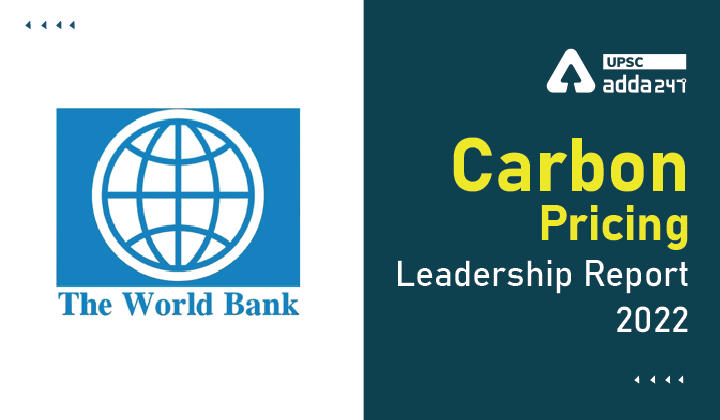Table of Contents
Carbon Pricing Leadership Report: Relevance
- GS 3: Bilateral, regional and global groupings and agreements involving India and/or affecting India’s interests.
Carbon trading system: Context
- Recently, World Bank has released a new report titled, ‘Carbon Pricing Leadership Report’, which presents the latest carbon pricing developments around the world.
Carbon Pricing Leadership Report 2022: Key points
- The report was launched at Innovate4Climate, the World Bank Group’s flagship annual event on climate finance, investment, and markets.
- The report has revealed that Global carbon pricing revenue in 2021 has increased by almost 60% from 2020 levels.
- Four new carbon pricing instruments were implemented since the release of the 2021 State and Trends of Carbon Pricing report.
Carbon Pricing Leadership Report 2022: Key findings
- The report finds that there are 68 direct carbon pricing instruments operating today: 36 carbon taxes and 32 Emissions Trading Systems (ETSs).
- Carbon prices hit record highs in many jurisdictions, including the European Union, California, New Zealand, the Republic of Korea, Switzerland and Canada.
- However, the report finds that less than 4 percent of global emissions are currently covered by a direct carbon price in the range needed by 2030 to meet the temperature goal of the Paris Agreement.
- Several countries have increased their carbon tax rates and adopted more ambitious trajectories. Moreover, pilot ETSs are being considered in a number of countries, including national and regional programs.
Carbon trading: Why needed?
- Even as COVID pandemic starts to recede, the war in Ukraine threatens to impact global development outcomes.
- Moreover, the findings of the latest IPCC reports provide a stark warning. We must decarbonize our economies at an accelerated pace and scale and reach net zero emissions by 2050.
- We must avoid fundamentally altering our planet’s climate and its irreversible impacts on development.
- Bold and swift action must be taken to ensure that we can realize green, resilient and inclusive development.
Read current affairs for UPSC





 TSPSC Group 1 Question Paper 2024, Downl...
TSPSC Group 1 Question Paper 2024, Downl...
 TSPSC Group 1 Answer key 2024 Out, Downl...
TSPSC Group 1 Answer key 2024 Out, Downl...
 UPSC Prelims 2024 Question Paper, Downlo...
UPSC Prelims 2024 Question Paper, Downlo...




